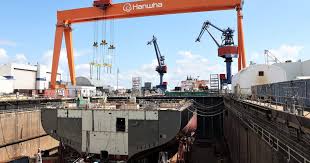South Korea’s Bold MASGA Initiative in U.S. Shipbuilding
South Korea has put forward a sizeable initiative called the Make American Shipbuilding Great Again (MASGA) project, designed to strengthen collaboration with the United States in shipbuilding just ahead of an important tariff negotiation deadline. This move aims to create a synergistic partnership to bolster the US shipbuilding industry through significant investments from South Korean firms, accompanied by support from the South Korean government.
Outline and Backing of the MASGA Project
The MASGA initiative takes inspiration from key themes of economic revitalisation and strategic industrial partnerships. It focuses on South Korean shipbuilders investing heavily in American shipbuilding facilities, supported by government-backed financial incentives like loans and guarantees. State-run financial bodies, including the Export-Import Bank of Korea and the Korea Trade Insurance Corporation, are expected to play a pivotal role in facilitating these investments.
U.S. Commerce Secretary Howard Lutnick has reportedly responded favourably during ministerial discussions, signalling positive engagement from the U.S. side. Nevertheless, South Korea’s Ministry of Trade, Industry and Energy has emphasised that the details of the proposal remain fluid, advising caution regarding media interpretations of the talks. Both countries apparently show strong intent toward cooperative efforts, promising further progress as negotiations proceed.
Key Features of the MASGA Agreement
- Investment Scale: Multi-billion pound financial commitments from South Korean conglomerates
- Government Support: Loans and guarantees from South Korean state-run financial institutions
- Strategic Cooperation: Strengthened bilateral ties to revive and expand US shipbuilding capacity
- Tariff Negotiation Context: Proposal framed within the broader economic discussions between the two nations
Why South Korea's Shipbuilding Strength Matters
South Korea's shipbuilding prowess provides considerable leverage in these negotiations, particularly since it aligns with desires to rejuvenate the American shipbuilding sector. The US industry has seen renewed interest in leveraging foreign partnerships to enhance technological and production capabilities.
Several major South Korean conglomerates are already making waves in the American market. HD Hyundai, for instance, is collaborating with Edison Chouest Offshore, aiming to deliver medium-sized container vessels produced domestically by 2028. Meanwhile, Hanwha’s acquisition of Philly Shipyard and its LNG carrier contract represent significant U.S. industrial milestones, especially since it is the first U.S.-ordered LNG carrier geared for export in nearly five decades.
South Korean Investments and US Shipbuilding Projects
| South Korean Firm | US Partner/Facility | Project Focus | Target Completion |
|---|---|---|---|
| HD Hyundai | Edison Chouest Offshore | Medium-sized container vessels | 2028 |
| Hanwha Ocean and Hanwha System | Hanwha Philly Shipyard | LNG carrier construction (first US-ordered export LNG ship in ~50 years) | Ongoing |
Implications for Global and Domestic Logistics
Though the MASGA proposal principally targets revitalising U.S. shipbuilding, the ripple effects inevitably touch global logistics and freight industries. Enhanced shipbuilding capabilities in the U.S. can lead to more reliable, modern fleets that serve the international shipping lanes, impacting freight, shipping, and forwarding operations worldwide.
Moreover, by fostering strong bilateral industrial partnerships, the project may influence supply chains, container shipping efficiency, and even the availability and scheduling of cargo vessels. This can improve the overall capacity and resilience of global logistics networks, including those facilitating large and bulky item transports—areas where platforms like GetTransport.com provide versatile and cost-effective transportation solutions worldwide, from house and office moves to heavy cargo haulage.
Potential Benefits for the Shipping and Freight Sector
- Modernisation of ship fleets leading to faster, more reliable deliveries
- Increased production capacity easing container and bulk shipment bottlenecks
- Stronger industrial ties enabling streamlined cross-border logistics
- Opportunities for domestic manufacturers and shipowners to compete globally
Why Personal Experience Still Trumps All Reviews
While official statements and industry reports offer valuable insights into initiatives like MASGA, the true test lies in personal engagement with the evolving logistics landscape. On platforms such as GetTransport.com, users can access transparent, competitive pricing and broad service options that help translate these industry shifts into real-world benefits. Whether moving office equipment, shipping vehicles, or handling bulky parcels and pallets, the platform enables an informed and cost-effective approach to logistics management.
By harnessing these tools, clients can bypass unnecessary costs and surprises, ensuring shipments proceed smoothly despite the complex dance of trade negotiations and industrial investments behind the scenes. Get the best offers now at GetTransport.com.
Looking Ahead: The MASGA Initiative and Logistics Industry
In the broader context of global logistics, South Korea’s MASGA project may not shift the entire landscape overnight but rather serves as a noteworthy development showing how international partnerships are essential for industrial growth and supply chain efficiency. As South Korean investments spur US shipbuilding, industries involved in shipping, freight forwarding, and haulage can expect gradual but meaningful improvements in resource availability and transport reliability.
GetTransport.com remains attuned to such developments, ensuring users have access to the best logistics solutions that reflect industry transformations. Start planning your next delivery and secure your cargo with GetTransport.com.
Висновок
The MASGA project represents a strategic and multifaceted effort by South Korea to stimulate American shipbuilding through targeted investments, government financial support, and collaborative industrial partnerships. This initiative not only aims to aid tariff talks but also promises to enhance the capacity and modernity of U.S. shipbuilding, with knock-on effects for global shipping, freight, and logistics sectors.
For businesses and individuals involved in cargo transport, from international shipping to heavy freight and house moves, keeping an eye on such developments is essential. Services like GetTransport.com provide the reliable and economical transport options needed in a world where the supply chain and the shipping industry are continually evolving. By offering flexible, global freight and cargo solutions, the platform helps meet diverse logistics needs efficiently. Whether it’s moving bulky goods, dispatching containers, or managing international shipments, GetTransport.com is a handy ally in navigating the complexities of modern logistics.

 South Korea’s MASGA Proposal Aims to Revitalize U.S. Shipbuilding and Boost Industry Cooperation">
South Korea’s MASGA Proposal Aims to Revitalize U.S. Shipbuilding and Boost Industry Cooperation">